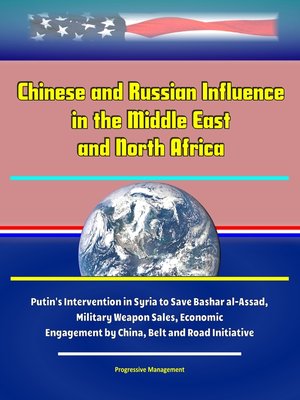Chinese and Russian Influence in the Middle East and North Africa
ebook ∣ Putin's Intervention in Syria to Save Bashar al-Assad, Military Weapon Sales, Economic Engagement by China, Belt and Road Initiative

Sign up to save your library
With an OverDrive account, you can save your favorite libraries for at-a-glance information about availability. Find out more about OverDrive accounts.
Find this title in Libby, the library reading app by OverDrive.



Search for a digital library with this title
Title found at these libraries:
| Library Name | Distance |
|---|---|
| Loading... |
This authoritative hearing report has been professionally converted for accurate flowing-text e-book format reproduction. From the introduction by Mr. Deutch:
In the fall of 2015, Russia launched a targeted military intervention in Syria to save the regime of Bashar al-Assad and ensure access to military bases on the Mediterranean Sea. Moscow has used this foothold to assert its interests throughout the region, to expand its political and military and economic influence, to reclaim its status as a great power, and to offer itself as an authoritarian alternative to the United States.
In recent years, Moscow conducted military exercises with Egypt and sold Cairo more than $2 billion worth of aircraft, cooperated with Saudi Arabia to stabilize global oil prices, expanded ties with Khalifa Haftar in Libya, engaged in discussions to sell the S-400 Missile Defense System to Qatar, and strengthened relations with both Iran and with Israel. China has also expanded its influence in the Middle East and North Africa in recent years, although in a different way. China's engagement has been primarily economic rather than military or political. Since 1995, the region has been China's No. 1 source of imported petroleum. China overtook the United States as the largest net importer of crude oil from the Middle East in 2013. By 2018, roughly 44 percent of China's crude oil imports came from nine Middle Eastern countries.
Every major regional actor, including Israel, Saudi Arabia, and Iran, has expressed interest in various projects of China's Belt and Road Initiative. If history teaches us anything, China is likely to increase its political engagement and expand its military footprint to secure these economic interests. Indeed, in 2017, Iran and China held a joint naval exercise in the Persian Gulf, and just last month Egypt hosted the Chinese and Russian navies in a training exercise.
This compilation includes a reproduction of the 2019 Worldwide Threat Assessment of the U.S. Intelligence Community.







